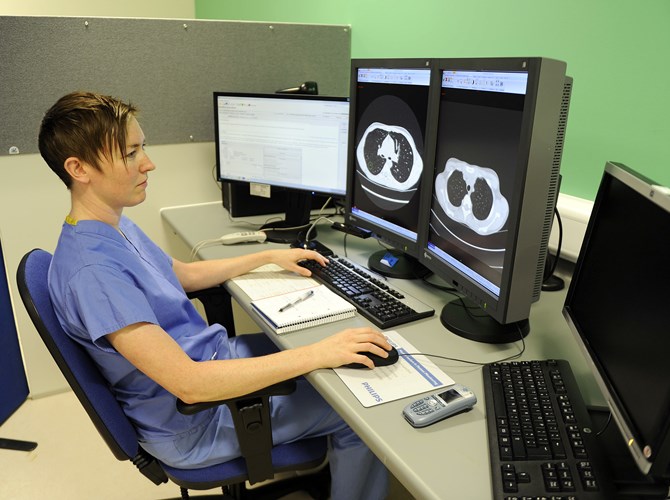Previous
Speech and language therapist
You must complete a pre-registration degree programme to become a therapeutic radiographer in the NHS.
Therapeutic radiographers are highly qualified, highly specialised professionals. They are the only profession in the UK that can legally deliver radiotherapy treatment.
Radiotherapy treatment uses high-energy radiation in a variety of ways to treat cancer and tumours while minimising damage to the surrounding healthy tissue. Accuracy is vital, and a variety of imaging techniques are used to verify positioning.
Therapeutic radiographers meet patients at a difficult and vulnerable time in their lives. Proving care, compassion, and support is essential to the role.

To get on a course that could lead to a career as a therapeutic radiographer, useful subjects include:
Speak to your guidance teacher about subjects offered at your school.

You may find it helpful to get some healthcare experience by doing a work placement or volunteering. You’ll get training, increase your knowledge, and learn new skills. This could help you when applying to university, college or a new job with NHSScotland.
Most universities accept a wide range of qualifications, giving you the option of applying directly from school or going to college first.
At college, you could do an HNC in a science-based subject before applying to university to do an undergraduate programme.
Widening participation supports adult learners who want to go to university. If you’re an adult with few or no qualifications, you could get into higher education through the Scottish Wider Access Programme (SWAP). Many universities also provide access programmes to help you get the degree entry qualifications you need.
Two universities in Scotland offer undergraduate programmes in Therapeutic Radiography or Radiotherapy and Oncology approved by the HCPC:
Pre-registration undergraduate programmes take 4 years full-time.
You should contact individual universities to find out about specific entry requirements.
After graduation, you must register with the HCPC. You can then apply as a newly qualified therapeutic radiographer for vacancies in the NHS.
As a therapeutic radiographer, you would be essential to the planning and delivery of a course of radiation treatment. This includes high-energy radiation, accurate radiation dose calculation, and the use of dedicated equipment.
During a patient's course of treatment, you'll build a relationship with them. You would also explain the process to them, including possible side effects, and answer any questions they have. During treatment, you would assess patients daily, monitor side effects, and provide support.
Tasks include:
You'll need these skills:
Therapeutic radiographers work with other healthcare professionals, including:
You'd work in hospital radiotherapy departments.
During your career, you’ll be expected to keep your skills and knowledge up to date through Continuing Professional Development. The Society of Radiographers (SoR) provides:
Visit the SoR website for more about training and CPD courses.
You may choose to specialise in a particular type of treatment, such as leading a breast treatment service as a consultant radiographer with independent prescribing rights.
Some therapeutic radiographers work with specific patient groups or specialise in treating patients of all ages with particular types of cancer. You could also move into management, either within radiography services or general management.
As head of a radiography service, you could be responsible both for a team of staff and for managing a budget.
You could also consider a career in research, teaching, or counselling therapies for cancer patients.
When you become a qualified therapeutic radiographer, you must register with the HCPC to work in the NHS. You can also join the Society of Radiographers.

Discover the range of AHP careers you can choose in the NHS.
Allied health professions
Our blog includes how-to guides, case studies, and career resources.
Discover more